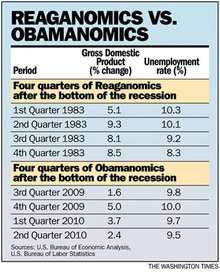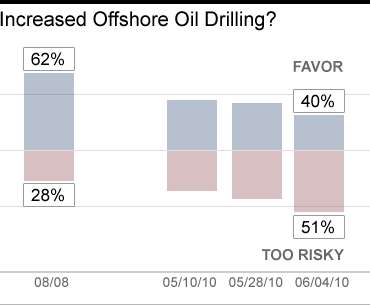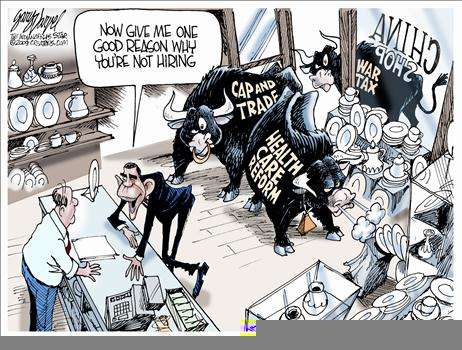I’ve decided the time has come to honor the advice of The Bastidge, and follow it. There is certainly a valid point to be made that the world, and therefore the populace that inhabits it, straddles a chasmatic divide separating two unacknowledged communities, and that each of these communities in perfect isolation would enjoy a harmony that must elude us as we co-exist with each other as a monolith. The divide has something to do with order versus chaos, clarity versus obfuscation, substance versus packaging, individual rights versus community obligations, opportunity versus security, pulling your weight versus fitting-in, logic versus emotion.
We’re seeing it right now with the health care debate. And it substantiates the point all the more when we observe that much of the controversy and dissention swirls around this ramshackle, oxymoronic thing called a “public option.”
I called this “Yin and Yang” out of a desire to get to the bottom of what causes people to pursue, throughout their entire lives, one way of thinking over another. The Yin work within boundaries; the Yang do not. The concept is centuries old, and dates back to periods in different world cultures in which femininity itself was a concept synonymous with the stewardship of quiet, contemplative female chores. In societies like this, it naturally follows that men think of things the way women do in ours, and women must think of things the way men do in ours. Here’s a litmus test: Friend of a friend buys a new car. Or, gets carjacked. It’s a great story to tell for sure, but who is to spend time talking about it?
In an agricultural setting, what happens to one has at least the likelihood of impacting everybody else. And so it makes good sense for people to get together somewhere and swap stories. But these are “Shut Your Girl Mouth Men Are Talking” societies. To whatever extent checking-this-out evolves to become a necessary household chore, it is a manly chore. A railroad’s coming to town, maybe (how does this change things?). Farmer Brown’s crops got wiped out by the cold weather (are ours next?). Who goes down to the saloon to find out about this stuff. It’s not the Mama; there are meals to be cooked, a floor to be swept.
Now, we have the automobile. The printing press. The Internet. Womens’ Lib. And when the time comes to swap tidbits of useful news, who does that? Here is what a lot of people are missing: This is a perfect reversal. We do not have mead halls where the men go to drink beer out of steins and compare prices of bushels of corn. It would be awesome if we did, for sure. But it’s not happening, because the gender roles in our society have flipped around in a perfect one-eighty. Men retreat into their own little worlds, not unlike the kitchens that enveloped their great-grandmothers. Their “kitchens” may be just about anything: A computer with a stubborn virus on it; a classic car that’s being rebuilt; a ham radio or a model train set down in the basement; but there is always a project, it always has a border around it, and that’s what men do.
This awesome Art of Manliness article offers a chronicling of what happened to our mead halls. It began, irony of ironies, with us guys being decent and kind enough to give the ladies the right to vote. Prohibition followed that, and…
For centuries, a man could visit a bar and be in the exclusive presence of other men. Because drinking was seen as a corrupting influence on the “purity and innocence” of women, bars were completely off limits to ladies (exceptions were made for prostitutes, of course). Out of the presence of women and children, men could open up more and revel in their masculinity over a mug of cold ale. However, the bar as a men’s only hangout would quickly see its demise during the dry years of Prohibition.
By banning alcohol, Prohibition forced drinking underground. Speakeasy owners, desperate to make a buck, accepted all drinkers into their establishments, regardless of gender. Moreover, the economic and political empowerment women experienced during the 1920s and 30s made drinking by women more acceptable. By the time Prohibition was repealed, the female presence at the local watering hole had become a common appearance.
World War II only further eroded the male exclusivity of bars and pubs. As more women entered the workforce, it became acceptable to socialize with their male co-workers in taverns and lounges after work.
Today, there aren’t many bars around that cater only to men (gay bars being an obvious exception). Instead, bars have become a place where the sexes come together to mingle and look for a special someone.
Note the article’s title: “The Decline of Male Space.” Men used to own the world. Now, we don’t. We have relinquished the privilege and obligation of socializing, turned it over to the gals, and toddled off to the basement to go play with our train sets. The women do what we used to do — they hold court and they compare their notes with each other, try to see if there’s some hidden meaning of everyday events that might affect the family.
This is precisely what their great-great-grandfathers did. The very same thing.
And so I grow weary of having to explain this. Yes, “Yin” is traditionally female, although I use it to describe a personality attribute that predominantly is to be found in our males. Yang, likewise, is traditionally male, although it describes things our women usually do and that our men, typically, don’t. The concept didn’t flip around, the gender roles did. And so, I have to concede that The Bastidge is accurate in his critique:
Your theory’s alright, if a bit vague and rambling. But Yin and Yang have a specific meaning, and you’re using them more or less backwards.
Yin is a concept roughly aligned with the female, but the concepts covered in your theory- group consciousness, socializing, consensus, softness, weakness, emotion, passivity, are all associated with it.
Yang is roughly male, but also strong, factual, direct, resolute, hard, aggresiive, etc.
In their crudest, most basic form, yin and yang refer to the female and male sexual organs.
My use of these names was arbitrary anyway, and that was on purpose. For the last five years I have seen these as placeholders for something more descriptive that would, and should, come later. After I’d given it another think. Well, with this morass of a health care “debate” that has been taking place, and will surely flare up again later this year, I’ve been forced to give it another think. Besides of which, I’ve met lots and lots of manly-male guys who do their thinking in a much “Yangy-er” way than a lot of the females…so the genders don’t fit well in any case.
And I think the terms are these:
Architects and Medicators.
The word “Architect” is chosen with care. Way back in our history, when written language was a novel idea, architects were “master builders” (which is the etymology of the term). These things they labored to construct, with every little piece of it not put in place properly, could very likely collapse and wipe out an entire family in a heartbeat. And so laws were passed condemning failed architects to a death by stoning (Code of Hammurabi, Law 229). That’s a little gruesome, but it had the effect of galvanizing their chosen profession into a noble discipline.
In their own little community, a “Climategate” e-mail scandal would not, could not, have been tolerated even for an instant. Things were the way they were — period. An angle was ninety degrees, or it wasn’t — period. Up was up and down was down — period. There was no room for bastardizing the peer review process into some mutation of what it was intended to be, to ostracize and excoriate colleagues who spoke measurable truth. The architect, hundreds of years before Christ, lived in an object-oriented world and thought about that world in an object-oriented way.
Okay, now let’s look at what I’ve set up as the polar opposite.
“Medicator,” similarly, is chosen with deliberate thought and intent. “Physician” doesn’t work because physicians are supposed to adhere to the Hypocratic Oath and First Do No Harm. The verb “medicate” is applied to addictions, primary among those being mind-altering substances. It speaks to a process of adjusting one’s emotional response to reality as a first priority, with recognizing that reality as a distinctly second-place priority. Medicators do not heal. Nor do they seek to do harm. The long-term welfare of the body is simply outside of their concern. It isn’t that they don’t care, it’s that there is an emotional well-being that they prize more highly.
To recognize reality as it really is, and to adjust one’s emotional profile in response to the reality so that it is unconditionally cheery, are two mutually-exclusive goals. It may not seem to be the case when reality happens to be pleasant. But when reality is unpleasant you can choose to wrestle with it to whatever extent is required to fix a problem, or you can choose to ignore it in order to keep your emotions on a high and even keel. The sacrifice of long-term satisfaction in order to achieve a short-term high is, of course, a defining hallmark of medicating.
 Now, these people trying to shove this fustercluck of a health care bill down our throats: It’s no mystery at all where they come down. They are medicators. It is not a primary goal of theirs to actually treat illnesses, heal the sick, bring “healthcare” or “access to healthcare” to “the uninsured.” Nor are they trying — architect-style — to solve any kind of a problem, President Obama’s unceasing speechifying notwithstanding. Think on it: When is the last time you heard anyone in Washington use those phrases above? Been awhile, hasn’t it? No, lately it’s about “getting this done.” Beating the opposition. Winning. Make things the way they/we want them to be. But wait just a second…we’re half way through an election cycle, one that began with their decisive victory. They already beat the opposition. Their victory is forgotten, however, just like a druggie’s high, and they find themselves incomplete, hungry, after-buzzed, struck with a raging case of Delerium Tremens if they don’t score another victory. And after they get that done, of course, they’ll need another and another and another. They live out their lives on a hairpin turn, just like a druggie. Time loses all meaning for them. Bliss is constantly one hit away.
Now, these people trying to shove this fustercluck of a health care bill down our throats: It’s no mystery at all where they come down. They are medicators. It is not a primary goal of theirs to actually treat illnesses, heal the sick, bring “healthcare” or “access to healthcare” to “the uninsured.” Nor are they trying — architect-style — to solve any kind of a problem, President Obama’s unceasing speechifying notwithstanding. Think on it: When is the last time you heard anyone in Washington use those phrases above? Been awhile, hasn’t it? No, lately it’s about “getting this done.” Beating the opposition. Winning. Make things the way they/we want them to be. But wait just a second…we’re half way through an election cycle, one that began with their decisive victory. They already beat the opposition. Their victory is forgotten, however, just like a druggie’s high, and they find themselves incomplete, hungry, after-buzzed, struck with a raging case of Delerium Tremens if they don’t score another victory. And after they get that done, of course, they’ll need another and another and another. They live out their lives on a hairpin turn, just like a druggie. Time loses all meaning for them. Bliss is constantly one hit away.
It’s not about health care, of course. It’s about how we think about the world around us. The medicator lives in a gilded cage, waiting passively for someone to come along and fix the latest problem. He does not solve real problems, he does not support anyone who would solve real problems, he does not live in reality. He considers reality itself to be an inimical force. This, ironically, provides a liberating effect. Of course it’s all about the way one does one’s thinking to perceive the world around him, and with someone else assuming the burden of actually fixing the problem, the thinker enjoys the luxury of thinking about things as a non-architect. In a non-object-oriented way. With every little thing on God’s creation, melted together into a sloppy mess. And this overly-medicated “thinker” does not think, in turn, about the resulting mess; instead, he picks up an emotional vibe from it, and shares it with other self-medicated thinkers. That’s the model of reality as perceived by the medicator: A great big ball of warm, gooey wax that’s all melted together, and is now giving off vibes. Hopefully good ones, but if they’re bad ones then someone else needs to fix something — or it’s time for another “hit” of something via one-more-revolution.
Disciplining a child provides a similar contrast. To the architect, everything is cause and effect: The child engaged in undesirable behavior, therefore something needs to be modified about what the child perceives as proper or improper. The solution is to teach the child a new taboo. This can be done through direct communication if the child shares the desire that his behavior should be proper, or through punishment if he does not. First of all the transgression has to be properly categorized — bad attitude, or simple misunderstanding? Then we assess what the child understands about etiquette and go from there. In the Architect’s world, that’s what we do.
In the Medicator’s world, the exercise really is one of medication! Concentrating on something is not a task that was, for one reason or another, failed in this case; it is an ability that has gone missing because the child’s “brain isn’t wired quite right.” Of course the solution is to put the child on a prescription for some goop that will alter his emotional state, and make the process “easier for him.” (It’s nearly always a him.)
Another acid test is when a complex system of any kind starts producing the wrong output, because some unit within it starts to go all wonky — with all the other units in good order. To the Architect and Medicator alike, this is a no-brainer, but they come up with polar-opposite solutions. The Medicator wants to chuck the whole thing and start from scratch, whereas the Architect sees a puzzle to be solved in separating what’s good from what’s busted. Think of Blondie and Dagwood getting in one of their matrimonial melees about whether to call the plumber.
I commented last month that I had finally expunged the malware from my HP Mini notebook. My victory announcement was premature, it turned out. The beastie lived on, downloading other crap onto my platform. It shames me to say it, but if I were to act purely on logic and reasonable cost-benefit analyses, I would have taken the “scorched earth” approach much, much earlier than I did, and lost a lot less time. It became an Ahab/whale thing; I lost sight of fixing the problem, and concentrated instead on figuring out entirely useless trivia about it. Where’d I pick up this thing? What exactly does it contaminate? How come these packages over here can detect it and fool themselves into thinking they’re cleaning it, when they’re not? How come that package over there seems to have “wounded” it (toward the end, it locked up the netbook instead of popping up an ad, which is what it was clearly trying to do)…but can’t quite get all of it?
See, neither Architects or Medicators enjoy a monopoly on always having the right idea. Medicators throw things away in bulk — they are much more inclined to announce “this entire thing is bolluxed!” That is often the right approach, and I have to make a confession…my second one, now…that I’ve often missed out on this advantage when it comes up. Medicators seem to think life has no puzzles in it, none whatsoever. And they probably think this because, in the world they construct around themselves by accepting some responsibilities and simply walking away from some other ones, they’re absolutely right. Choices confront them — choices in which the wrong answer results in some kind of personal suffering — and they become petulant, unpleasant, and then someone else swoops in and solves it for them.
In their world, the question of who gets the “rep” as a problem solver, is completely isolated from the record of who did or didn’t actually solve problems. At no time has this been more evident, than this first year of watching our new President struggle with the demands of His new job. He is a dedicated Medicator. He fixes nothing. The only responsibility He takes is to refine the emotional buzz that comes from this thing or that one…and having failed even at that, He has a ready finger-of-blame to point somewhere else so He can give Himself a good report card. Which He did, actually. That one single act speaks volumes not only to how He thinks about the world and the challenges within it; it is a tip-off to how medicators think as well. You’ll notice this about them if you know some really dedicated ones personally. They enter into conflict with others, because they tend to demand the final word about their own work. It was up to par, the other guy just has a mistaken interpretation of “par.” They followed the instructions they were given, it’s the other guy’s fault for not giving them the right ones.
Running a meeting is yet another good litmus test. Some meeting chairs do it right: Agenda item, question, answer, does anyone have any objections, next agenda item — boom, boom, boom. Others engage in this ludicrous and time-consuming practice of using the forum to adjust the emotional tenor of the participants, as if it’s a high school pep rally. Buying a car: Any salesman will tell you, some people turn their thoughts to the TCO with considerations such as gas mileage, service records, availability of parts. Others worry overly much about how they look when they’re tooling around in the car, what strangers will think of them.
Homeowners’ Association bylaws can be written to accommodate one of these halves of humanity, or the other, or both. This is a rather interesting situation, because the bylaws represent an attempt to “architect” a successful neighborhood, through the “medication” of the emotions of the people who observe it. Here and there, though, we see stories in the news surrounding HOA bylaws that are, to turn a rustic phrase, just plain stupid. They don’t do anything to make people feel good and it seems extravagant and far-fetched to suppose they could have anything to do with preserving the value of the property. Banning the American flag is the one example that springs immediately to mind, since those stories have a way of jumping onto the front page.
The last time we linked one of these, the story in question showcased a persistent trait among the Medicators: proxy offense.
[M]anagement told them the flags could be offensive because they live in a diverse community.
The controlling curmudgeon lays down the curmudgeonly rule, and the curmudgeon is silent on whether he or she personally finds the emblem, the e-mail, the cologne, the pin-up calendar, et al, offensive. It’s much more often proxy: Some third party is offended. Or some third party could be offended. The impossible-to-meet “Could Be Interpreted As” standard of cleanliness. It is conceivably possible, therefore the contraband has to go. The curmudgeon will oversee the removal. But it’s business and not personal, see? Just like something out of The Godfather: “Tell Michael I always liked him, it was business, not personal.” Some nameless faceless anonymous person complained, or could complain.
This dedicated Architect says — Medicators really shouldn’t be running anything. They don’t want to. They don’t want the responsibility. This is why these columns are now coming out, some serious and some satirical, that speculate openly that President Obama is perhaps bored and disenchanted with His own job. I no longer consider it to be commentary outside my sphere of knowledge, to proffer that President Obama had some serious misgivings the first time He made a decision about something that had little-or-nothing to do with winning an election, saw that His decision had a direct bearing upon the outcome, and emotionally recoiled. I have seen this happen too many times, up close. In the months since then, the country has been buried in this “awkward stage” in which He tries to confront each and every single challenge with a vision that, as this-or-that chapter reaches the final page, the emotional buzz of those watching has been fine-tuned and frothed up into a desirable state of bliss. This is, I’m sure, why we’ve seen so many speeches out of Him during His first year, and will doubtless see about that many out of Him during His second.
We live in a society in which our every want and need is met, with resistance or inconvenience that is at best negligible. It may not seem like that to us at the time because we’re spoiled; we tend to mistake a temporary slow-down, or wrong turn, or setback, for a real possibility of failure in acquiring what we’re trying to acquire. Deep down, we all know we’re not really being challenged by much of anything; we will get what we are trying to get, one way or the other, so long as some minimal quantity of our peers are also trying to get the same thing. If all else fails we’ll band together and our populist rage will force someone to give it to us. We’re supposed to be so worried about “the economy” but we have our beer, our coffee, our big teevee screens. The only things that are really in jeopardy are the self-respect and dignity that come from having a job, and the same for our children. All other things are guaranteed, in one way or another. They don’t face any real jeopardy.
This state of hyper-safe hyper-civilization has aggravated the divide between — whate’er you wanna callzem, Yin and Yang, or Architects and Medicators — as I’ve pointed out before. It creates a bigger divide on such fundamental questions as: What is a good speech, anyway? What is a convincing argument? Is it thinky-thinky or feelie-feelie? In other words, do you progress systematically among the first three pillars, basing your opinions/inferences upon available fact and things-to-do upong the opinions/inferences. Or, do you just stir up a whole lot of motivating emotions in your audience, get them all outraged against some straw-man Snidely Whiplash, anti-logical exuberance for your “ideas,” Obama-style?
And the fact is, Architects have a definite idea in mind about the answer to such rudimentary questions.
Another fact is, Medicators have a definite idea about the answer as well. These ideas are not the same. They are opposites.
Another fact is, neither side is willing to budge on such issues. If you have a pulse, and a brain, and you’ve been using your brain to solve problems that confront you here and there…each day you stay alive further enmeshes you in the answer you chose, way back, before you were five years old.
And the least inconvenient fact of all is that if we cannot agree on questions like those, we aren’t going to agree on anything else.
We are engaged in a discourse between people who understand how to make real decisions, and those who do not understand this and do not seek to understand this. They don’t see the need. But since they’ve “won,” for the time being it is their job…even if they continue to find ways to weasel out of it, and blame others when the job goes undone.











 Perhaps just a smidgen. A wing. A foot, maybe. Well, let’s get it choked down. Clean your plate when crow is on it, for if you leave leftovers you should expect a steady diet of it.
Perhaps just a smidgen. A wing. A foot, maybe. Well, let’s get it choked down. Clean your plate when crow is on it, for if you leave leftovers you should expect a steady diet of it. New data show that the gaps in after-tax income between the richest 1 percent of Americans and the middle and poorest parts of the population in 2007 was the highest it’s been in 80 years, while the share of income going to the middle one-fifth of Americans shrank to its lowest level ever.
New data show that the gaps in after-tax income between the richest 1 percent of Americans and the middle and poorest parts of the population in 2007 was the highest it’s been in 80 years, while the share of income going to the middle one-fifth of Americans shrank to its lowest level ever. It’s a
It’s a  Now, these people trying to shove this fustercluck of a health care bill down our throats: It’s no mystery at all where they come down. They are medicators. It is not a primary goal of theirs to actually treat illnesses, heal the sick, bring “healthcare” or “access to healthcare” to “the uninsured.” Nor are they trying — architect-style — to solve any kind of a problem, President Obama’s unceasing speechifying notwithstanding. Think on it: When is the last time you heard anyone in Washington use those phrases above? Been awhile, hasn’t it? No, lately it’s about “getting this done.” Beating the opposition. Winning. Make things the way they/we want them to be. But wait just a second…we’re half way through an election cycle, one that began with their decisive victory. They already beat the opposition. Their victory is forgotten, however, just like a druggie’s high, and they find themselves incomplete, hungry, after-buzzed, struck with a raging case of Delerium Tremens if they don’t score another victory. And after they get that done, of course, they’ll need another and another and another. They live out their lives on a hairpin turn, just like a druggie. Time loses all meaning for them. Bliss is constantly one hit away.
Now, these people trying to shove this fustercluck of a health care bill down our throats: It’s no mystery at all where they come down. They are medicators. It is not a primary goal of theirs to actually treat illnesses, heal the sick, bring “healthcare” or “access to healthcare” to “the uninsured.” Nor are they trying — architect-style — to solve any kind of a problem, President Obama’s unceasing speechifying notwithstanding. Think on it: When is the last time you heard anyone in Washington use those phrases above? Been awhile, hasn’t it? No, lately it’s about “getting this done.” Beating the opposition. Winning. Make things the way they/we want them to be. But wait just a second…we’re half way through an election cycle, one that began with their decisive victory. They already beat the opposition. Their victory is forgotten, however, just like a druggie’s high, and they find themselves incomplete, hungry, after-buzzed, struck with a raging case of Delerium Tremens if they don’t score another victory. And after they get that done, of course, they’ll need another and another and another. They live out their lives on a hairpin turn, just like a druggie. Time loses all meaning for them. Bliss is constantly one hit away. “The rich” can get ahold of it and the poor people cannot, so someone gets the idea of “reform.” No one defines what the R-word really means, because anyone who’s in a position to communicate with the public about it understands reform is only appealing until people understand what it is. So some new laws are created to make the commodity “equally available to everyone.”
“The rich” can get ahold of it and the poor people cannot, so someone gets the idea of “reform.” No one defines what the R-word really means, because anyone who’s in a position to communicate with the public about it understands reform is only appealing until people understand what it is. So some new laws are created to make the commodity “equally available to everyone.” 10. Say it. At work, rest or play, nobody ever mumbles; misspellings are exceedingly rare; if an idea is worth expressing, it’s worth expressing properly.
10. Say it. At work, rest or play, nobody ever mumbles; misspellings are exceedingly rare; if an idea is worth expressing, it’s worth expressing properly. Colleges are rapidly adding new majors and minors in green studies, and students are filling them fast.
Colleges are rapidly adding new majors and minors in green studies, and students are filling them fast. Stupid regulations by Democrats cause the banking crisis. Banks tank on bad debt that was required by stupid regulations by Democrats. Banks “saved” by being owned by the government with tax payer dollars. Banks pay back money, because, surprise!, government is a harsh task-master. Government blames the bankers for….fulfilling their obligation. Then, President Obama tells bankers to make more loans….probably to the very people who couldn’t afford loans to begin with.
Stupid regulations by Democrats cause the banking crisis. Banks tank on bad debt that was required by stupid regulations by Democrats. Banks “saved” by being owned by the government with tax payer dollars. Banks pay back money, because, surprise!, government is a harsh task-master. Government blames the bankers for….fulfilling their obligation. Then, President Obama tells bankers to make more loans….probably to the very people who couldn’t afford loans to begin with. This really is rich. The Community Organizer told House Republican leaders that they needed to “stop trying to frighten the American people.”
This really is rich. The Community Organizer told House Republican leaders that they needed to “stop trying to frighten the American people.”